Discover the Best AI Image Recognition Tools for Accurate Visual Identification
Are you looking for the best AI image recognition tools on the market? Look no further! In this analysis article, we will introduce you to the top AI tools that excel in accurate visual identification. Each tool boasts unique features and capabilities that can revolutionize your computer and machine vision tasks. From Chooch AI's sophisticated algorithms to Viso.ai's comprehensive no-code platform, these tools are designed to enhance your organization's image recognition capabilities. Whether you need image analysis, data management, or automation, these AI tools have got you covered. Let's dive in and discover the best AI image recognition tools available right now.
1. Chooch AI Vision
Chooch AI Vision is a cutting-edge AI tool specializing in enhancing computer and machine vision capabilities for various industries. It utilizes sophisticated AI algorithms to enable organizations to detect, analyze, and interpret a large volume of visual data in real-time.
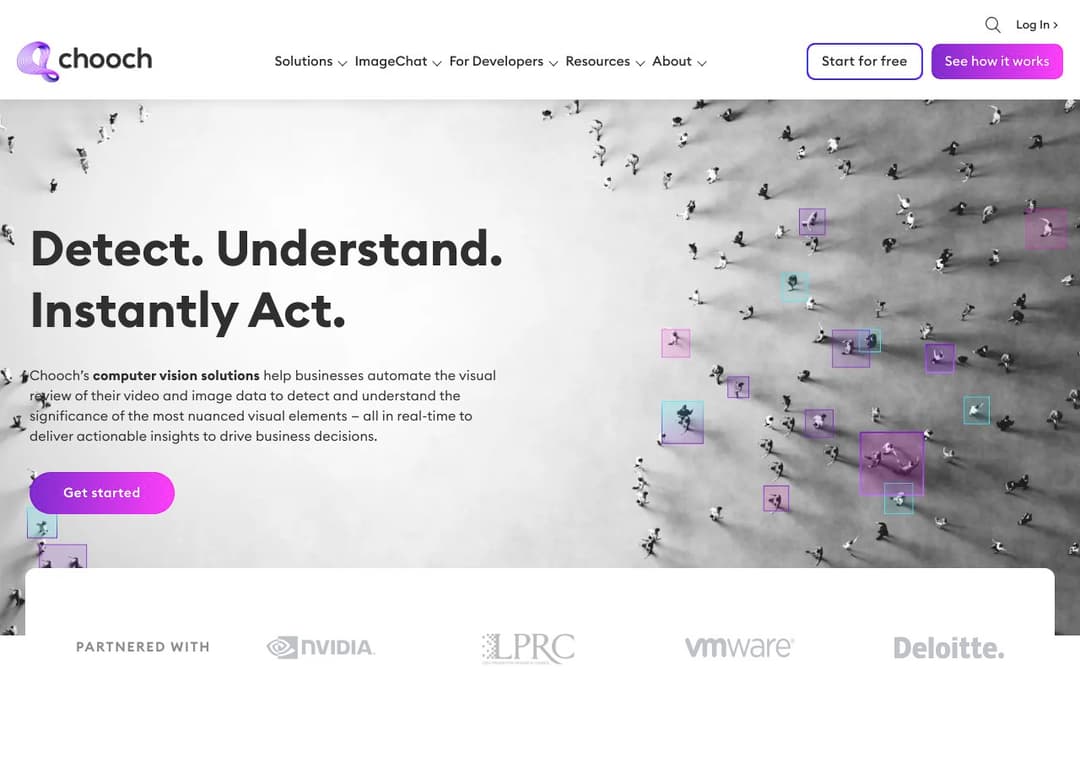
Pricing:
Contact Chooch AI for pricing information.
Features:
Advanced Computer Vision: Detect, analyze, and process visual objects, images, and actions in videos.
Industry Applications: Beneficial for architecture, interior design, industrial design, retail, manufacturing, healthcare, geospatial, telco, public sector, and smart cities.
Ready-to-Use AI Vision Solutions: Pretrained models available for common computer vision use cases.
Flexible Deployment Options: Supports on-premise and cloud deployment.
Optimized for GPU/CPU: Performance optimization for various hardware configurations.
Continuous Learning: AI model enhances effectiveness and personalization over time.
Advisory Services: Consultative design, data collection, annotation & labelling, model development, prototype testing, integration, support & growth.
Pros:
Provides real-time analysis of visual data.
Suitable for a wide range of industries.
Pretrained models for quick implementation.
Continuous learning for improved accuracy over time.
Cons:
Pricing information not readily available; contact needed for details.
2. Viso Suite
Viso Suite is a comprehensive, no-code computer vision platform designed for enterprise requirements. It enables the integration of camera streams with advanced deep learning algorithms and offers a range of pre-trained AI models.
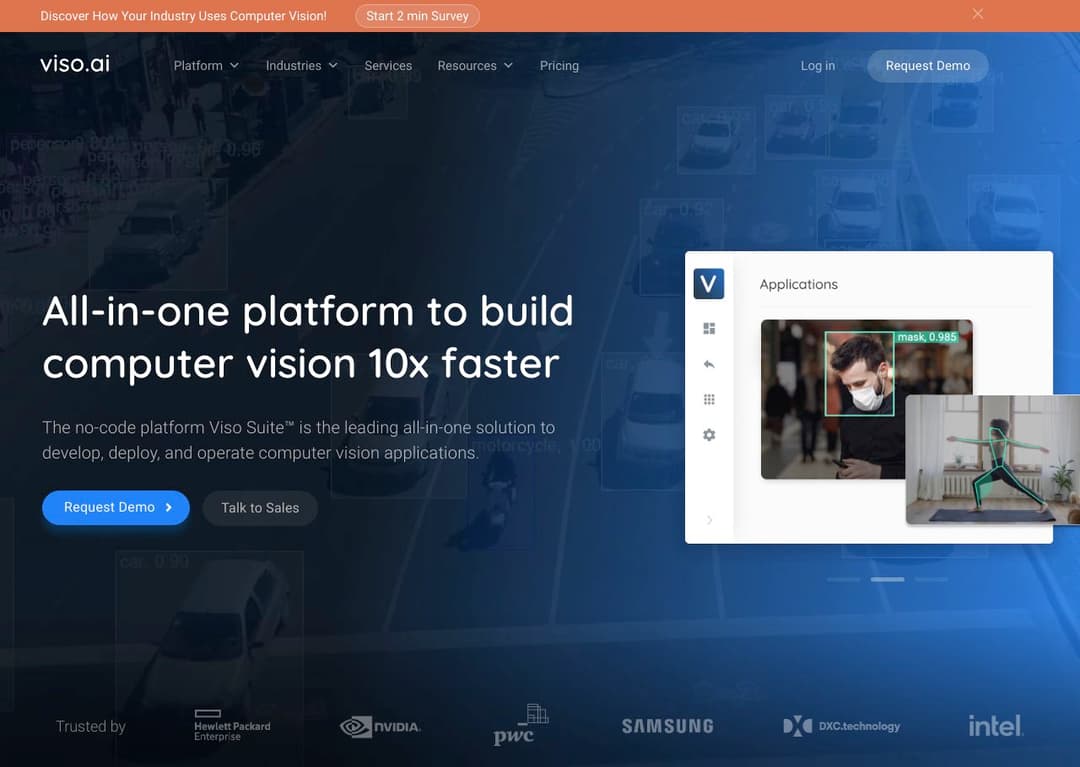
Pricing:
Pricing details not publicly available
Features:
Automated Number Plate Recognition
AI-based Ergonomic Risk Analysis
Automated Object Counting
Eye Gaze Detection
Abandoned Object Detection
Automated Safety and Compliance Monitoring
Facial Emotion Analysis
Deep Face Recognition
Weapon Detection
Pros:
No-code development platform
Integration with advanced deep learning algorithms
Over 55 pre-trained AI models available
Flexible and extensible for various enterprise needs
Cons:
Specific pricing details not publicly available
3. OpenCV
OpenCV (Open Source Computer Vision Library) is an open source computer vision and machine learning software library. It contains over 2500 algorithms and is operated by the non-profit Open Source Vision Foundation. Initially developed by Intel, OpenCV is designed for computational efficiency with a strong focus on real-time applications.
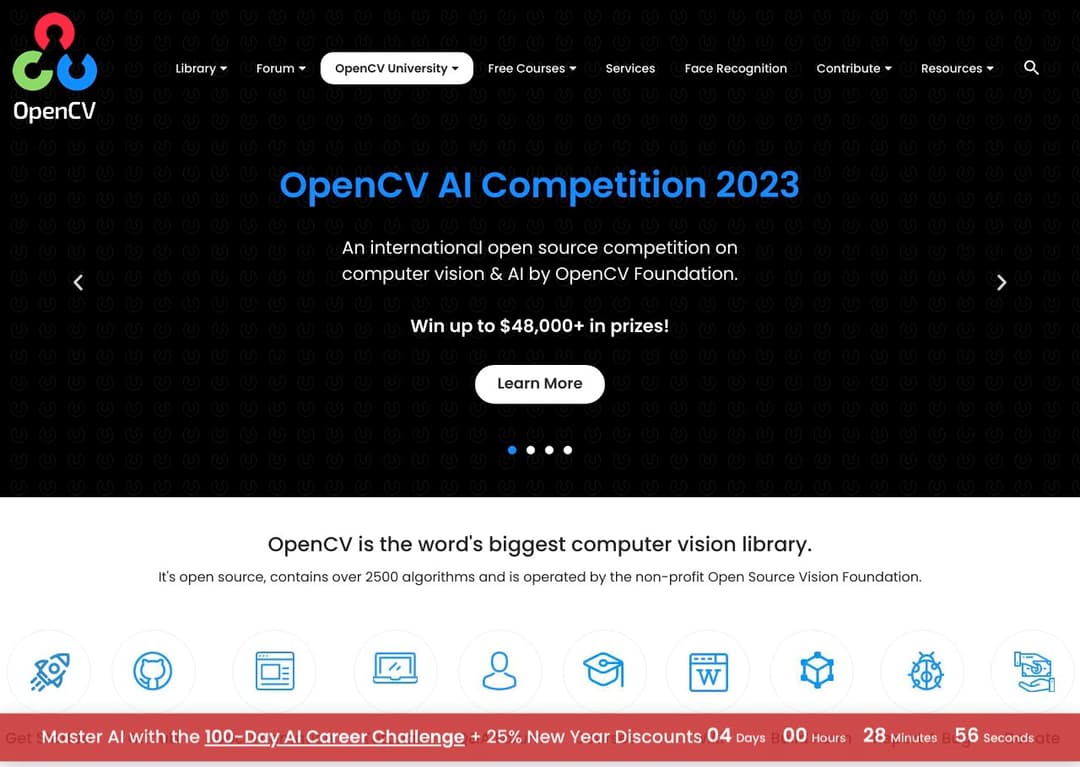
Pricing:
OpenCV is open source and released under the Apache 2 License, making it free for commercial use.
Features:
Read and write images
Capture and save videos
Image processing such as filtering and transformation
Feature detection
Object detection
Video analysis
Pros:
Highly optimized for real-time applications
Supports multiple programming languages and platforms
Extensive set of algorithms for computer vision and machine learning
Cons:
Python interface may be slower compared to C/C++
Steep learning curve for beginners
Broad scope may be overwhelming for specific use-cases
4. Landing.ai
Landing AI specializes in pioneering the Data-Centric AI movement, allowing companies with limited data sets to leverage AI and transition AI projects from proof-of-concept to full-scale production. Their flagship product, LandingLens, simplifies computer vision for a wide range of users.
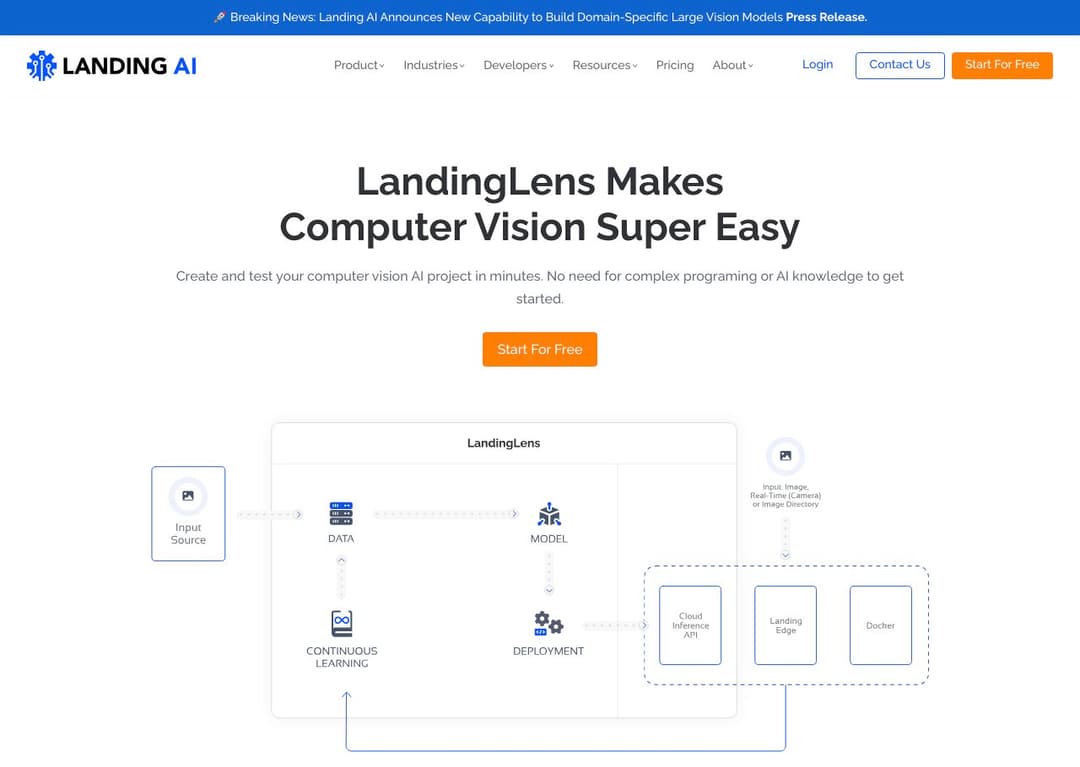
Pricing:
Free: $0/mo - Ideal for hobbyists starting out, up to 5 projects, 250 images per project, image labeling, and more.
Starter: Specifics not provided - Suitable for individuals to start and scale projects.
Visionary: Specifics not provided - Best for small teams and businesses.
Enterprise: Custom pricing - Tailored for large-scale business needs.
Features:
Data-Centric AI approach.
Computer vision made easy with LandingLens.
Domain-Specific Large Vision Models (LVMs).
Integration capabilities with various software solutions.
Support for various industries including automotive, electronics, manufacturing, and more.
Pros:
Pioneers in Data-Centric AI.
Ease of use with LandingLens.
Wide range of applications across industries.
Cons:
Specific details on pricing for Starter and Visionary plans not provided.
May require technical expertise for optimal use.
5. Clarifai
Clarifai is a Generative AI Developer Platform that offers a toolkit for the entire AI lifecycle, including data preparation, model development, testing, evaluation, and operationalization. It supports various AI methodologies like transformers, vision transformers, and convolutional neural networks.
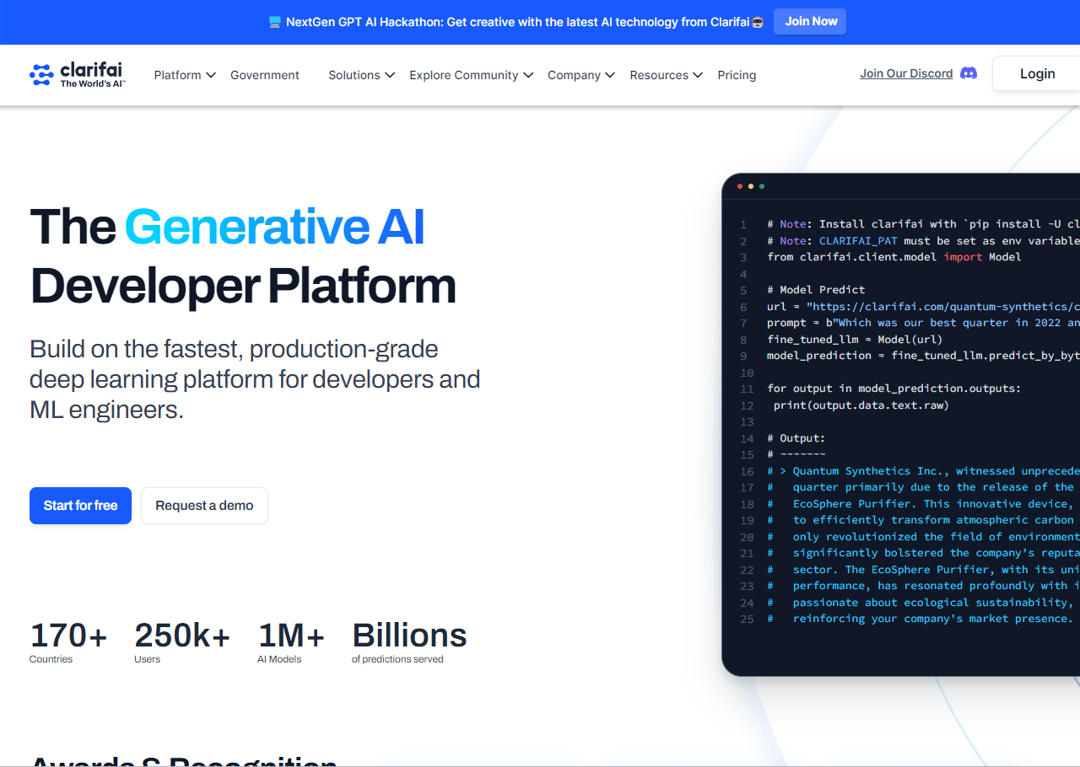
Pricing:
Data Store Applications: Support for different data types and application functionalities.
Scribe Label: Features for labeling concepts, classification, and annotation.
Spacetime Search: Advanced search capabilities using AI models.
Mesh Workflow: Management of trained models, custom workflows, and workflow graphs.
Enlight Train: Options for model training and managing model versions.
Features:
AI Lake: Central platform for team collaboration.
Spacetime Vectors and Search: Advanced vector embeddings and search capabilities.
Scribe Automated Data Labeling: Automation-first approach for data labeling.
Enlight Training and Evaluation: UI for model training and evaluation.
Armada: Auto-scaling model inference engine.
Mesh: Workflow engine with drag-and-drop interfaces.
Extend: Streamlit UI modules for various tasks.
Collectors: Production data collection for continuous learning.
Pros:
Comprehensive toolkit covering the entire AI lifecycle.
Supports a wide range of AI methodologies for diverse applications.
User-friendly UI and API for ease of use.
Cons:
May require technical expertise for complex operations.
Integration with existing systems can be challenging.
6. Cogniac
Cogniac is a technology company specializing in enterprise computer vision platforms. It uses AI and convolutional neural networks for operational performance enhancement through visual data management and automation. The company targets sectors like automotive, railway, manufacturing, safety and security, and more.
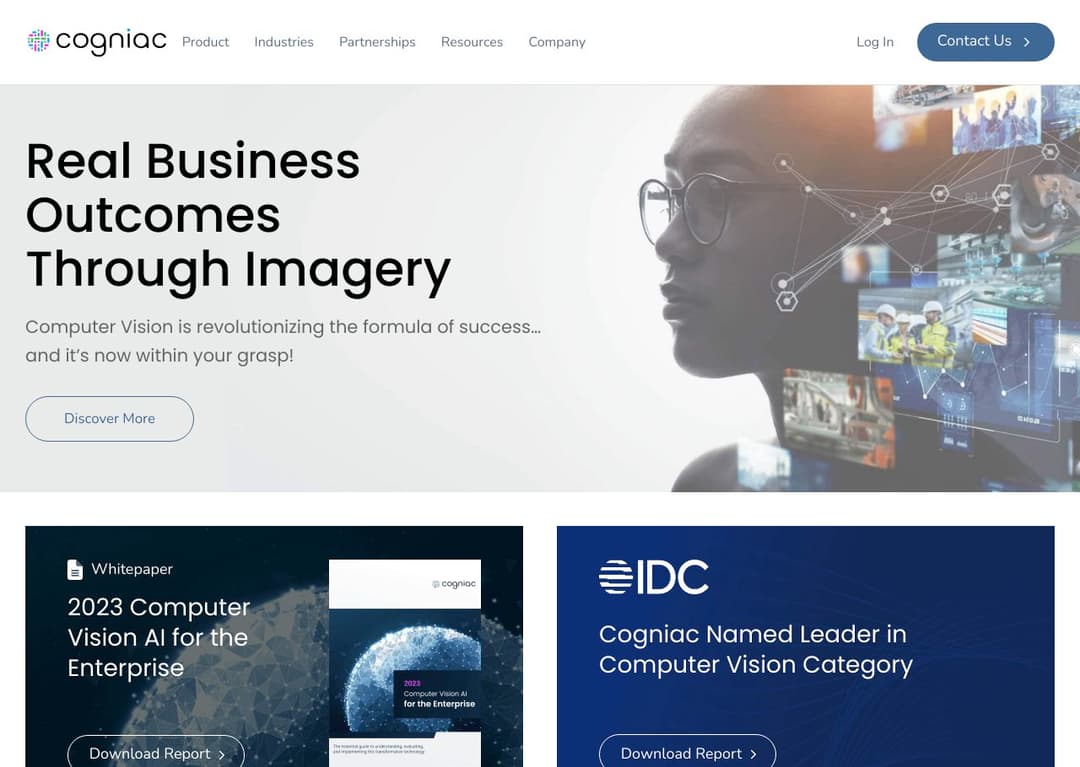
Pricing:
Pricing information not publicly available
Features:
Low-code AI platform
Integration into business operations
Enhancement of performance using visual data
Capability to operate in cloud, on-prem, or on the edge
Pros:
High levels of accuracy and efficiency
Adaptability to diverse and complex environments
Superhuman consistency in operations
Cons:
Limited public information on pricing
May require specialized knowledge for optimal use
7. Superb AI
Superb AI is a platform designed for automating data preparation and enhancing the efficiency of data work, thereby democratizing AI accessibility. It is tailored for machine learning, data science, and labeling teams to produce superior quality datasets and foster collaboration and productivity. The platform simplifies large-scale data labeling and management, featuring automated labeling, quality control, and comprehensive project management capabilities.
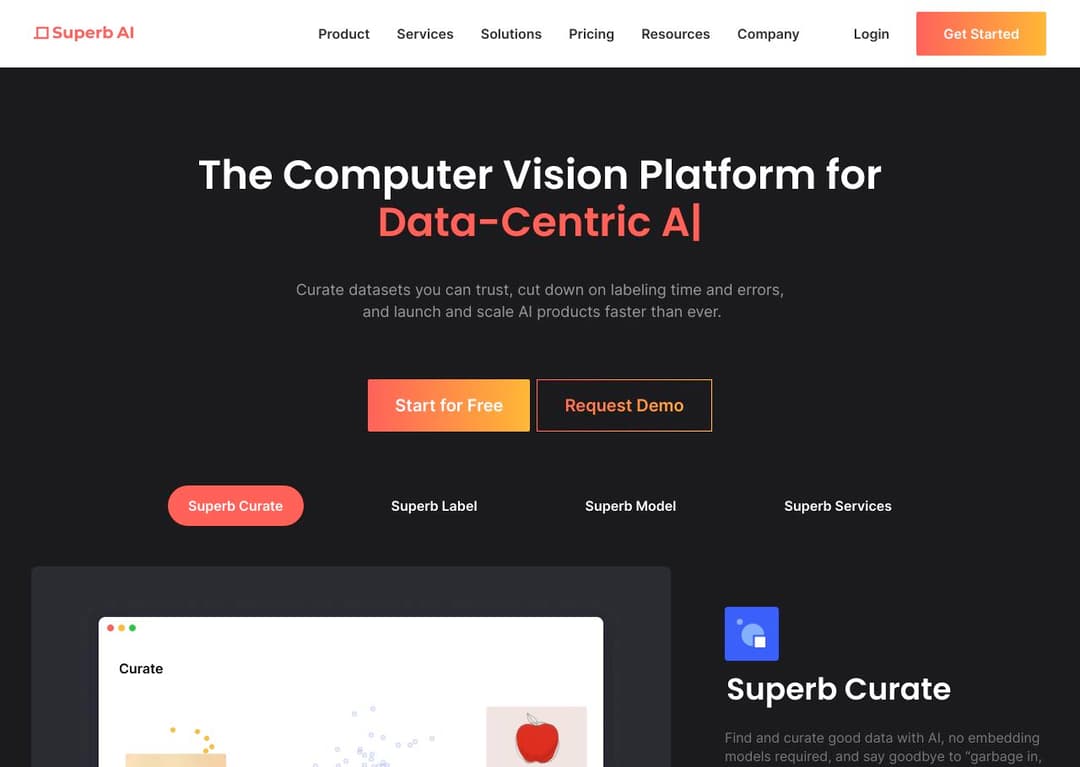
Pricing:
The platform offers a Free Trial.
Features:
Interactive Labeling Technology
Auto Labeling with Predefined and Customized Models
Mislabel Detection Technology
Embedding Store for Semantic Search and Data Curation
Model Diagnosis for Performance Analysis and Improvement
Pros:
Simplifies manual labeling process
Automates labeling with high accuracy
Efficient management of datasets and resources
Reduces time and cost involved in dataset management
Cons:
Requires initial setup and familiarization
Dependent on the quality of pre-trained models for auto labeling
May need customization for specific use cases
8. Aivia
Aivia combines powerful artificial intelligence-guided image analysis and visualization solutions for data-driven scientific discovery.
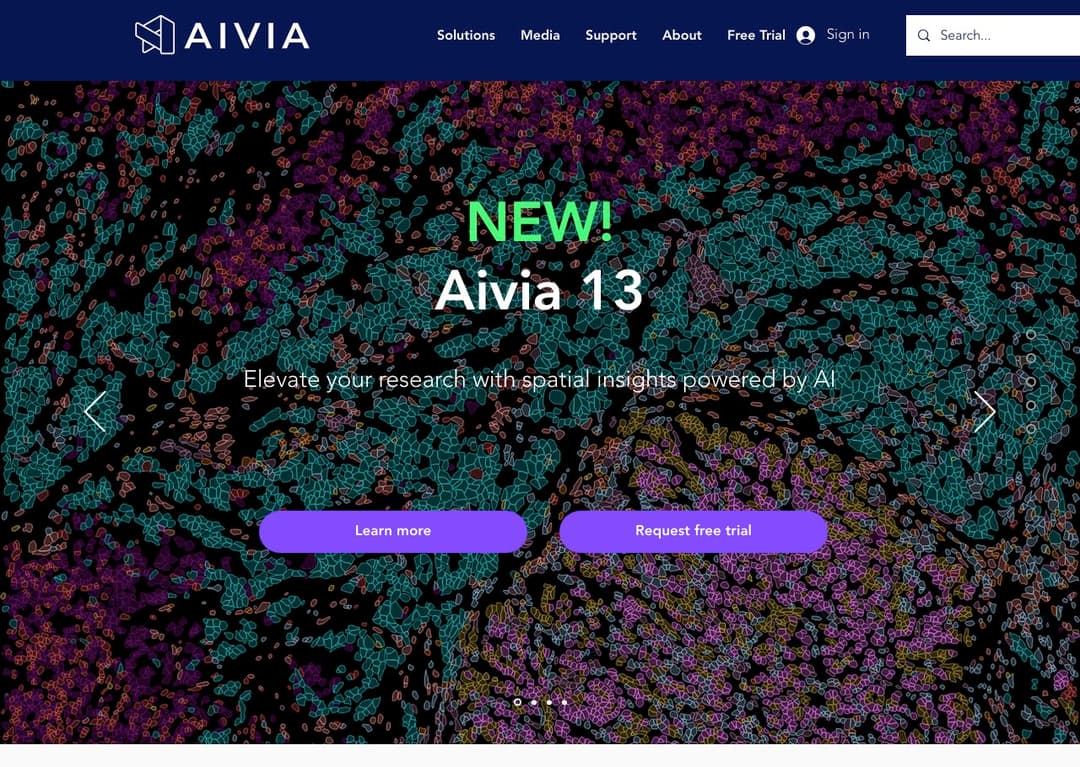
Pricing:
Go: Everything you need to start analyzing your images
Elevate: Take your AI image analysis to the next level with CellBio or Neuro
Apex: The all-in-one image analysis solution
AI DevMode: Train your own deep learning models
Features:
Deep learning
Teravoxel 3D rendering
Virtual reality
Neuron tracing
3D tracking
Unrivaled support
Pros:
AI-enabled tools simplifying key steps in imaging analysis
Tailored solutions for data
Technical support and free software upgrades
Flexible subscription model
Cons:
9. Lobe
Lobe is a user-friendly, no-code AI tool designed to simplify the process of training machine learning models. It enables users to train custom machine learning models by showing examples, automatically training a model that can be integrated into apps. No coding or data science experience is required.
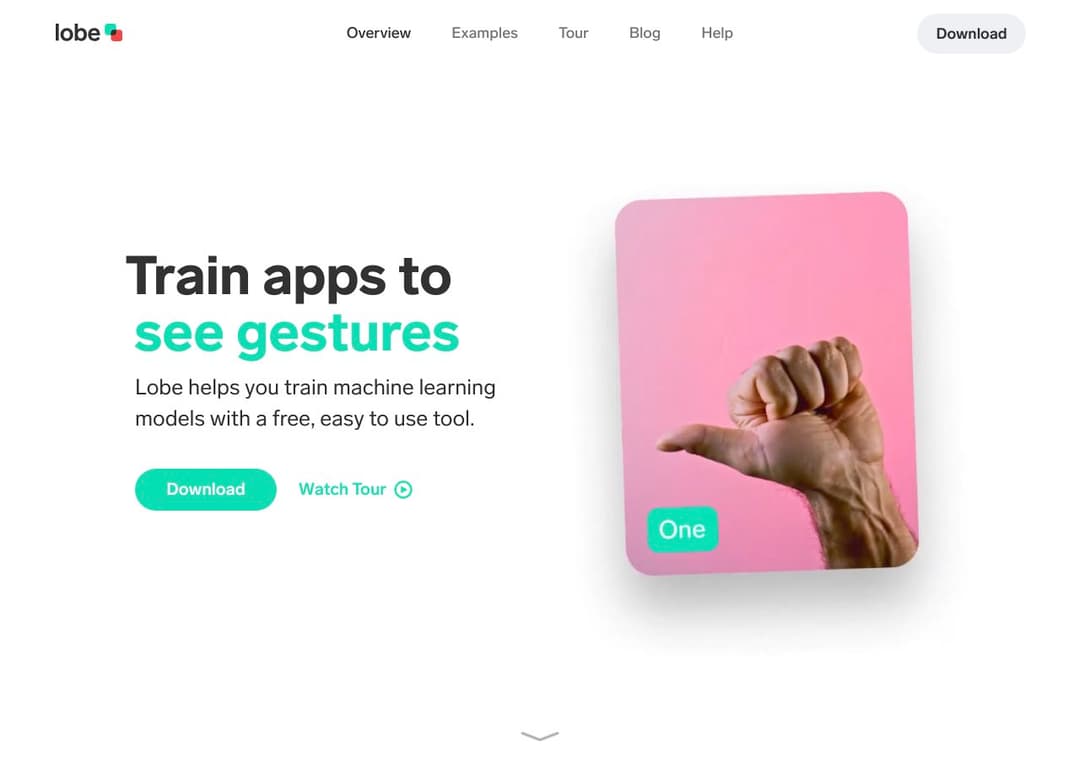
Pricing:
Free
Features:
No-code machine learning model training
Easy-to-use interface
Customizable models for app integration
Automatic selection of machine learning architecture
Private training on the user's computer without data upload to the cloud
Export models to various formats and platforms
Pros:
Free and easy to use
Automatic machine learning architecture selection
Ability to export models to various formats and platforms
Cons:
Currently only supports image classification
Requires a powerful computer for optimal performance
Limited control or customization over the machine learning process
10. Imagga
Imagga is an innovative AI-driven image tagging and classification platform that uses advanced artificial intelligence algorithms to analyze images, providing comprehensive tags and metadata. It is designed for easy integration into workflows and offers various features like image recognition, categorization, and automatic tagging.
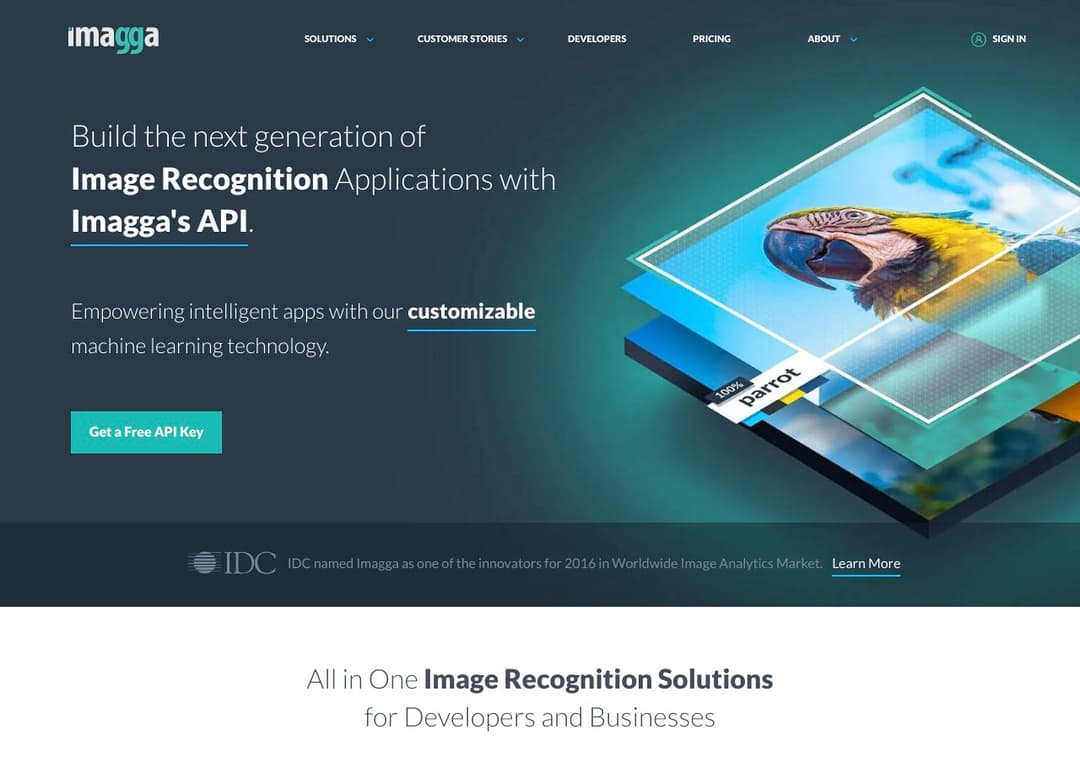
Pricing:
Indie: $79 per month
Pro: $349 per month
Features:
Automated Image Tagging
Effortless Image Categorization
Smart Image Cropping
Insightful Color Analysis
Intuitive Visual Search
Custom Training
Custom Model Creation
Face Recognition
Object Localization
Text Recognition
Content Moderation
Pros:
Comprehensive suite of image recognition solutions
Powerful APIs for image analysis and organization
User-friendly interface
Wide application across various industries
Cons:
Pricing may be a barrier for smaller businesses or individual users
Summary:
In conclusion, there are several top AI image recognition tools available for accurate visual identification. Chooch AI Vision offers cutting-edge AI algorithms for real-time analysis of visual data. Viso Suite provides a comprehensive platform with advanced deep learning algorithms and pre-trained AI models. OpenCV is an open source library known for its computational efficiency and real-time application focus. LandingLens by Landing AI simplifies computer vision for various users. Clarifai offers a complete toolkit for the AI lifecycle, supporting different AI methodologies. Cogniac specializes in enterprise computer vision platforms for operational performance enhancement. Superb AI automates data preparation and labeling, fostering collaboration and productivity. Aivia provides AI-guided image analysis solutions for scientific discovery. Lobe is a user-friendly, no-code tool for training custom machine learning models. Imagga offers advanced image tagging and classification features for easy integration into workflows.